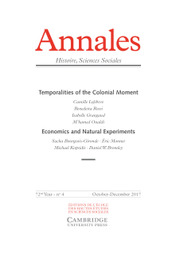No CrossRef data available.
Article contents
For a History-Oriented Approach to Islamic Studies
Published online by Cambridge University Press: 15 November 2024
Abstract

- Type
- Introduction
- Information
- Copyright
- © Éditions de l’EHESS 2024
Footnotes
This introduction was first published as “Pour une islamologie historienne,” Annales HSS 73, no. 2 (2018): 311–16. It was translated from the French by Rodney Coward and edited by Victoria Harris and Chloe Morgan.
References
1. Edward W. Said, Orientalism (New York: Pantheon Books, 1978).
2. Shahab Ahmed, What Is Islam? The Importance of Being Islamic (Princeton: Princeton University Press, 2016), 5.
3. Pierre Bourdieu, “The Economics of Linguistic Exchanges,” Social Science Information 16, no. 6 (1977): 645–68, here p. 646.
4. Between 1951 and 1972, Berque published no fewer than thirteen contributions to the Annales, nine of which were articles. Of particular interest is his reading of a body of fifteenth-century Maghrebi jurisprudence: Jacques Berque, “Les hilaliens repentis ou l’Algérie rurale au xve siècle d’après un manuscrit jurisprudentiel,” Annales ESC 25, no. 5 (1970): 1325–53.
5. Lucette Valensi, “Présentation,” in “L’orientalisme aujourd’hui,” Annales ESC 35, no. 3/4 (1980): 417.
6. Clifford Geertz, Islam Observed: Religious Development in Morocco and Indonesia (New Haven: Yale University Press, 1968); Ernest Gellner, Muslim Society (Cambridge: Cambridge University Press, 1981).
7. Houari Touati, “Approche sémiologique et historique d’un document hagiographique algérien,” Annales ESC 44, no. 5 (1989): 1205–28.
8. Ismail Warscheid, Droit musulman et société au Sahara prémoderne. La justice islamique dans les oasis du Grand Touat (Algérie) aux xviie–xixe siècles (Leiden: Brill, 2017).
9. Khaled El-Rouayheb, Islamic Intellectual History in the Seventeenth Century: Scholarly Currents in the Ottoman Empire and the Maghreb (New York: Cambridge University Press, 2015).
10. Isabelle Grangaud and M’hamed Oualdi, “Tout est-il colonial dans le Maghreb ? Ce que les travaux des historiens modernistes peuvent apporter,” L’année du Maghreb 10 (2014): 233–54.
11. This criticism is based on the abundant work in the areas of sociology and religious anthropology published since the 1990s: José Casanova, Public Religions in the Modern World (Chicago: University of Chicago Press, 1994); Talal Asad, Formations of the Secular: Christianity, Islam, Modernity (Stanford: Stanford University Press, 2003); Armando Salvatore, The Public Sphere: Liberal Modernity, Catholicism, Islam (Basingstoke: Palgrave Macmillan, 2007); Nadine Picaudou-Catusse, L’islam entre religion et idéologie. Essai sur la modernité musulmane (Paris: Gallimard, 2010); Humeira Iqtidar, Secularizing Islamists? Jama‘at-e-Islami and Jama‘at-ud-Da‘wa in Urban Pakistan (Chicago: University of Chicago Press, 2011).
12. David Motadel, ed., Islam and the European Empires (Oxford: Oxford University Press, 2014); Oissila Saaïdia, Algérie coloniale. Musulmans et chrétiens, le contrôle de l’État, 1830–1914 (Paris: CNRS Éditions, 2015); Pierre Vermeren, La France en terre d’islam. Empire colonial et religions, xixe–xxe siècles (Paris: Belin, 2016); Luc Chantre, Pèlerinages d’empire. Une histoire européenne du pèlerinage à La Mecque (Paris: Éd. de la Sorbonne, 2018).
13. David Robinson, Paths of Accommodation: Muslim Societies and French Colonial Authorities in Senegal and Mauritania, 1880–1920 (Athens/Oxford: Ohio University Press/J. Currey, 2000); David Robinson and Jean-Louis Triaud, eds., Le temps des marabouts. Itinéraires et stratégies islamiques en Afrique occidentale française, v. 1880–1960 (Paris: Karthala, 2012).
14. Sean Hanretta, Islam and Social Change in French West Africa: History of an Emancipatory Community (Cambridge: Cambridge University Press, 2009).
15. Jürgen Osterhammel, Die Verwandlung der Welt. Eine Geschichte des 19. Jahrhunderts (Munich: C. H. Beck, 2009).
16. Cemil Aydin, The Idea of the Muslim World: A Global Intellectual History (Cambridge: Harvard University Press, 2017).
17. Marwa Elshakry, Reading Darwin in Arabic, 1860–1950 (Chicago: University of Chicago Press, 2013); Omnia El Shakry, The Arabic Freud: Psychoanalysis and Islam in Modern Egypt (Princeton: Princeton University Press, 2017); Yoav Di-Capua, No Exit: Arab Existentialism, Jean-Paul Sartre, and Decolonization (Chicago: University of Chicago Press, 2018).
18. Catherine Mayeur-Jaouen, “‘In Pursuit of Reform’: Historiographical Renewals and Debates on the Religious and Intellectual History of Islam from the Fifteenth to the Twenty-First Century,” Annales HSS (English Edition), 10.1017/ahsse.2024.7.


